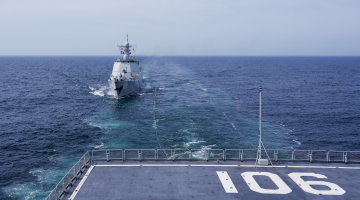By WANG QINGYUN
China is seriously concerned and strongly dissatisfied with the joint statement from the US-Philippines 2+2 Ministerial Dialogue, Foreign Ministry spokesman Wang Wenbin said on Wednesday, urging countries in the Asia-Pacific not to pander to external forces.
The remark came one day after foreign and defense secretaries from the United States and the Philippines met in Washington and issued the statement.
In the statement, the two allies called on China to comply with the "arbitral award on the South China Sea" in 2016 — an illegal, null and void "award" that China does not recognize.
Dismissing the statement, Wang said China has indisputable sovereignty over islands in the South China Sea and the adjacent waters, and has clearly and firmly rejected and disavowed the "arbitral award".
Rendered in July 2016 by an arbitral tribunal established at the unilateral request of the Philippines, the "arbitral award" is a serious violation of international law, including the United Nations Convention on the Law of the Sea, and is illegal and null.
The statement distorts and smears China's lawful maritime law enforcement activities, and uses unfounded rumors to slander China, and China is firmly opposed to this, Wang said.
"We hope to properly handle maritime differences through negotiations and consultations with related countries, but will firmly safeguard our territory, sovereignty and maritime rights and interests," he said.
Also in the joint statement, the US said it expects to support "swift operationalization" of the four new military sites in the Philippines that it will get access to.
Three of the sites are located in Cagayan and Isabela, facing the Taiwan Straits. The other site is in Palawan, which faces the South China Sea.
"Judging from the locations, the intention of the new sites goes without saying. The joint statement's emphasis on the 'swift operationalization' of the sites has added another footnote to such an intention," Wang said.
The key to peace and stability in the Asia-Pacific lies in regional countries' adherence to mutual trust, solidarity and cooperation, Wang said, urging the countries to "take the lifeline of security firmly in their own hands".
"We would like to remind relevant regional countries once again that by pandering to external forces, they will not only fail to maintain their own security, but also aggravate tensions, and harm regional peace and stability, as well as themselves," the spokesman added.









